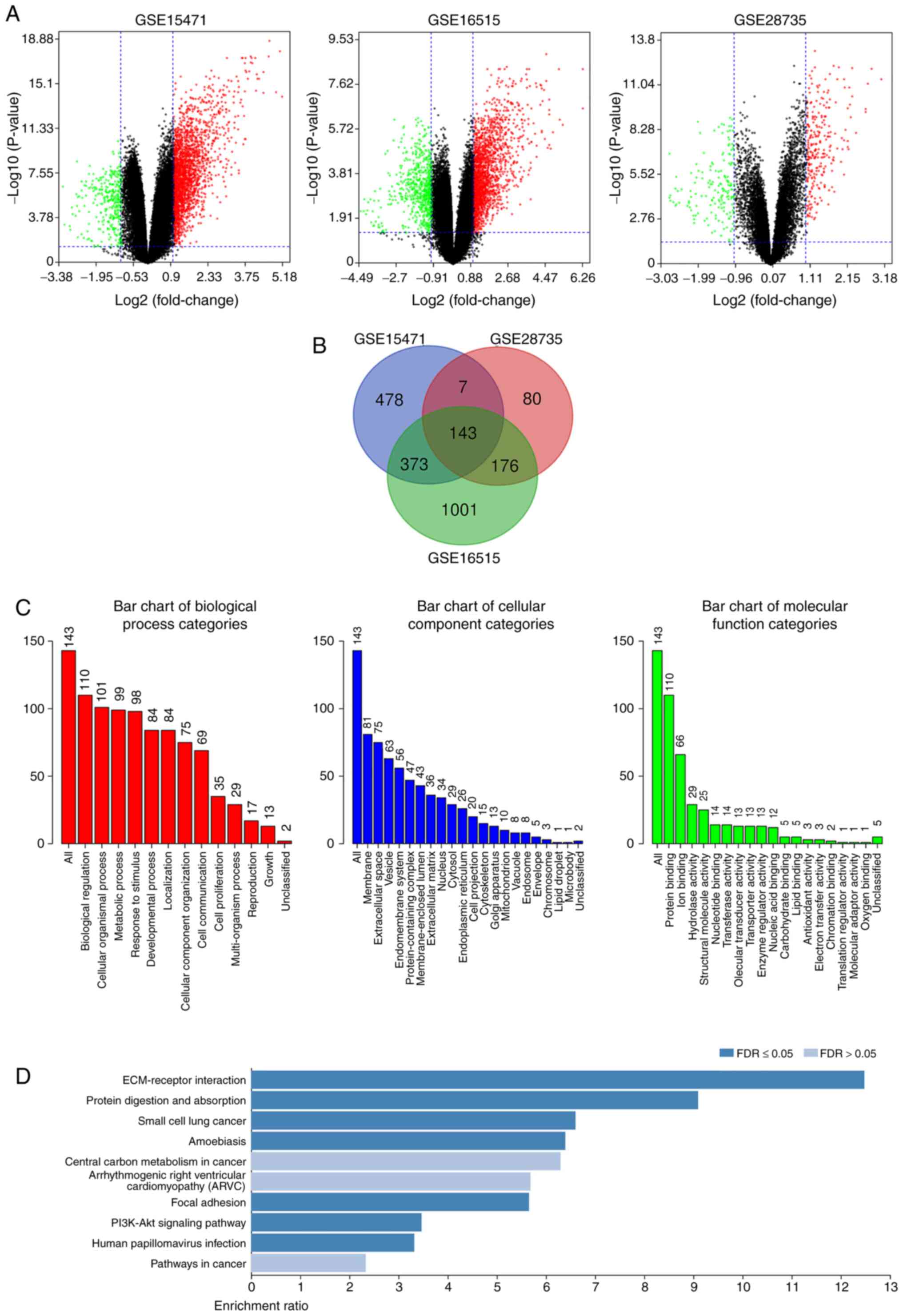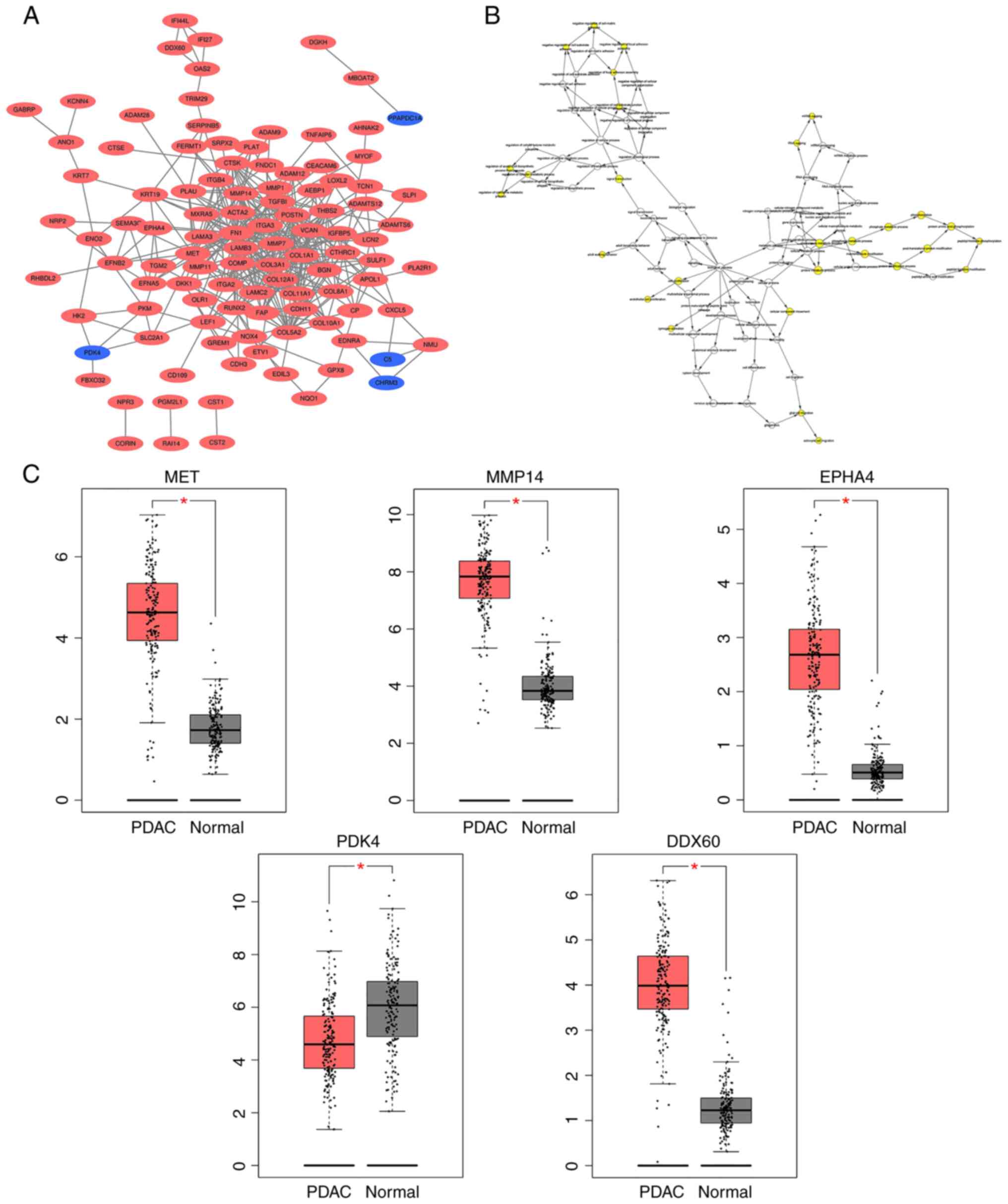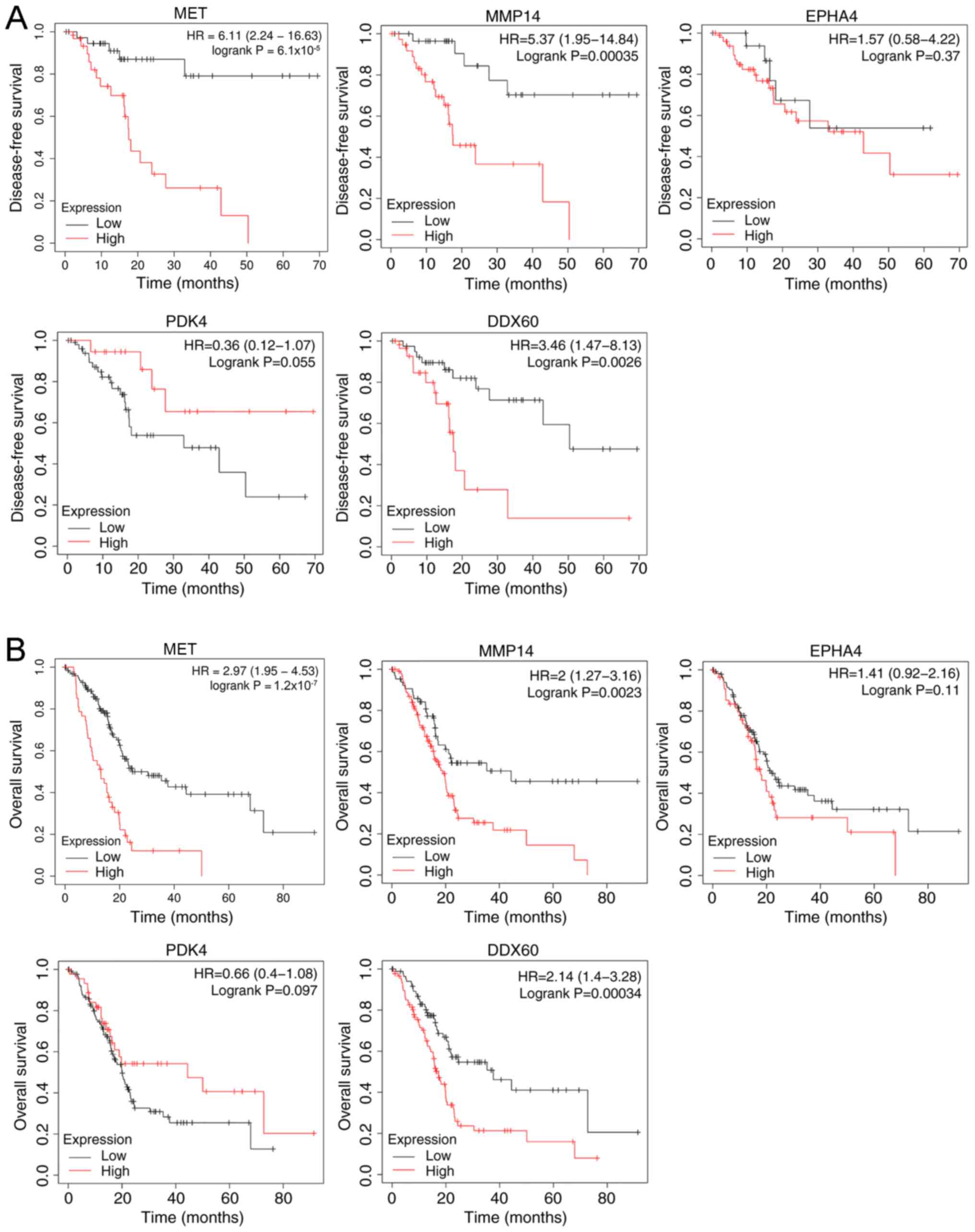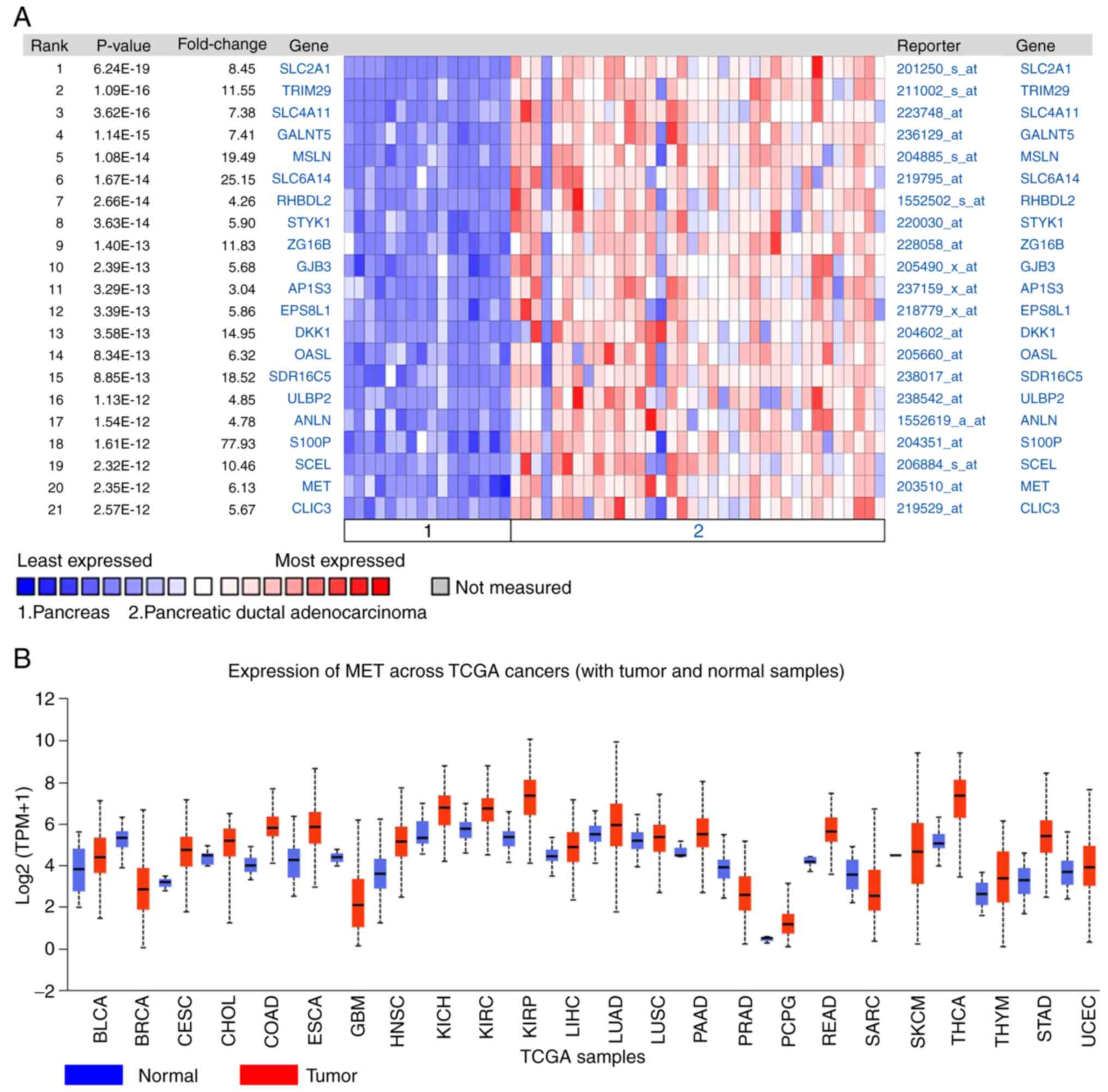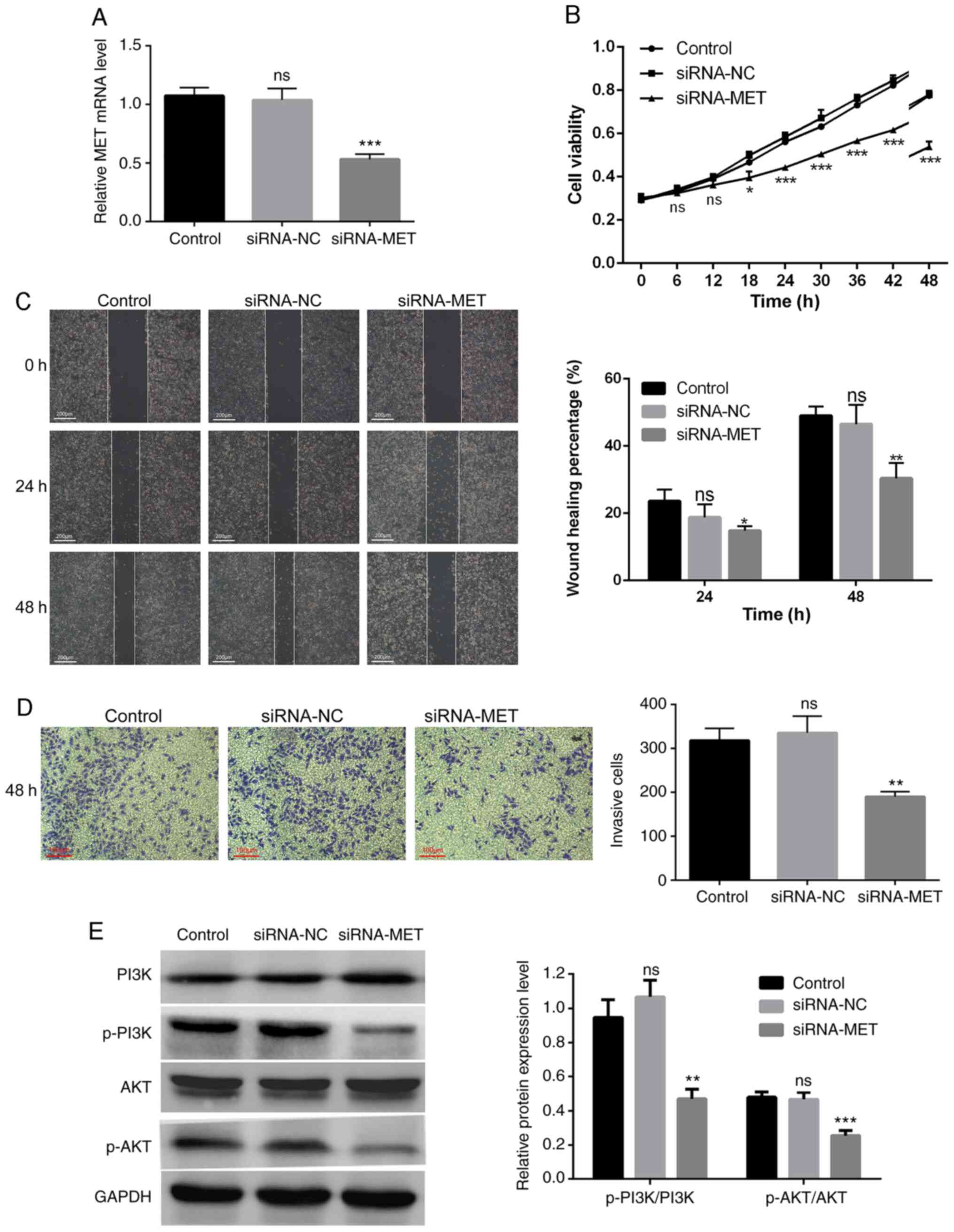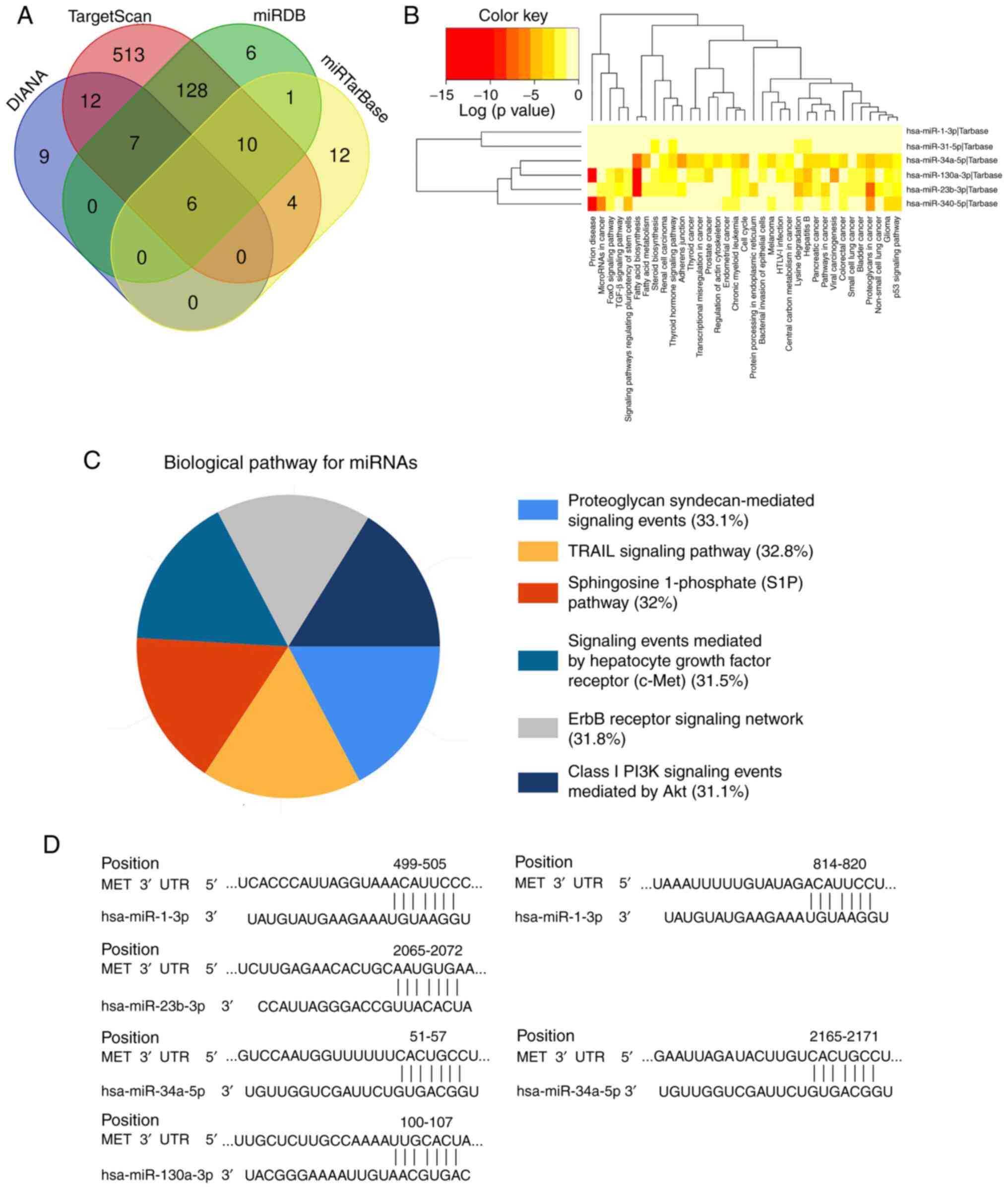|
1
|
Ilic M and Ilic I: Epidemiology of
pancreatic cancer. World J Gastroenterol. 22:9694–9705. 2016.
View Article : Google Scholar : PubMed/NCBI
|
|
2
|
Lin QJ, Yang F, Jin C and Fu DL: Current
status and progress of pancreatic cancer in China. World J
Gastroenterol. 21:7988–8003. 2015. View Article : Google Scholar : PubMed/NCBI
|
|
3
|
Zhou B, Xu JW, Cheng YG, Gao JY, Hu SY,
Wang L and Zhan HX: Early detection of pancreatic cancer: Where are
we now and where are we going? Int J Cancer. 141:231–241. 2017.
View Article : Google Scholar : PubMed/NCBI
|
|
4
|
Garrido-Laguna I and Hidalgo M: Pancreatic
cancer: From state-of-the-art treatments to promising novel
therapies. Nat Rev Clin Oncol. 12:319–334. 2015. View Article : Google Scholar : PubMed/NCBI
|
|
5
|
Waddell N, Pajic M, Patch AM, Chang DK,
Kassahn KS, Bailey P, Johns AL, Miller D, Nones K, Quek K, et al:
Whole genomes redefine the mutational landscape of pancreatic
cancer. Nature. 518:495–501. 2015. View Article : Google Scholar : PubMed/NCBI
|
|
6
|
Dreyer SB, Chang DK, Bailey P and Biankin
AV: Pancreatic cancer genomes: Implications for clinical management
and therapeutic development. Clin Cancer Res. 23:1638–1646. 2017.
View Article : Google Scholar : PubMed/NCBI
|
|
7
|
Bailey P, Chang DK, Nones K, Johns AL,
Patch AM, Gingras MC, Miller DK, Christ AN, Bruxner TJ, Quinn MC,
et al: Genomic analyses identify molecular subtypes of pancreatic
cancer. Nature. 531:47–52. 2016. View Article : Google Scholar : PubMed/NCBI
|
|
8
|
Li L, Lei Q, Zhang S, Kong L and Qin B:
Screening and identification of key biomarkers in hepatocellular
carcinoma: Evidence from bioinformatic analysis. Oncol Rep.
38:2607–2618. 2017. View Article : Google Scholar : PubMed/NCBI
|
|
9
|
Badea L, Herlea V, Dima SO, Dumitrascu T
and Popescu I: Combined gene expression analysis of whole-tissue
and microdissected pancreatic ductal adenocarcinoma identifies
genes specifically overexpressed in tumor epithelia.
Hepatogastroenterology. 55:2016–2027. 2008.PubMed/NCBI
|
|
10
|
Pei H, Li L, Fridley BL, Jenkins GD,
Kalari KR, Lingle W, Petersen G, Lou Z and Wang L: FKBP51 affects
cancer cell response to chemotherapy by negatively regulating Akt.
Cancer Cell. 16:259–266. 2009. View Article : Google Scholar : PubMed/NCBI
|
|
11
|
Zhang G, Schetter A, He P, Funamizu N,
Gaedcke J, Ghadimi BM, Ried T, Hassan R, Yfantis HG, Lee DH, et al:
DPEP1 inhibits tumor cell invasiveness, enhances chemosensitivity
and predicts clinical outcome in pancreatic ductal adenocarcinoma.
PLoS One. 7:e315072012. View Article : Google Scholar : PubMed/NCBI
|
|
12
|
Tian T, Wang J and Zhou X: A review:
microRNA detection methods. Org Biomol Chem. 13:2226–2238. 2015.
View Article : Google Scholar : PubMed/NCBI
|
|
13
|
Hayes J, Peruzzi PP and Lawler S:
MicroRNAs in cancer: Biomarkers, functions and therapy. Trends Mol
Med. 20:460–469. 2014. View Article : Google Scholar : PubMed/NCBI
|
|
14
|
Mishra S, Yadav T and Rani V: Exploring
miRNA based approaches in cancer diagnostics and therapeutics. Crit
Rev Oncol Hematol. 98:12–23. 2016. View Article : Google Scholar : PubMed/NCBI
|
|
15
|
Qu K, Zhang X, Lin T, Liu T, Wang Z, Liu
S, Zhou L, Wei J, Chang H, Li K, et al: Circulating miRNA-21-5p as
a diagnostic biomarker for pancreatic cancer: Evidence from
comprehensive miRNA expression profiling analysis and clinical
validation. Sci Rep. 7:16922017. View Article : Google Scholar : PubMed/NCBI
|
|
16
|
Ashburner M, Ball CA, Blake JA, Botstein
D, Butler H, Cherry JM, Davis AP, Dolinski K, Dwight SS, Eppig JT,
et al: Gene ontology: Tool for the unification of biology. The gene
ontology consortium. Nat Genet. 25:25–29. 2000. View Article : Google Scholar : PubMed/NCBI
|
|
17
|
Kanehisa M, Furumichi M, Tanabe M, Sato Y
and Morishima K: KEGG: New perspectives on genomes, pathways,
diseases and drugs. Nucleic Acids Res. 45(D1): D353–D361. 2017.
View Article : Google Scholar : PubMed/NCBI
|
|
18
|
Rabbani G, Baig MH, Ahmad K and Choi I:
Protein-protein Interactions and their role in various diseases and
their prediction techniques. Curr Protein Pept Sci. 19:948–957.
2018. View Article : Google Scholar : PubMed/NCBI
|
|
19
|
Rhodes DR, Yu J, Shanker K, Deshpande N,
Varambally R, Ghosh D, Barrette T, Pandey A and Chinnaiyan AM:
ONCOMINE: A cancer microarray database and integrated data-mining
platform. Neoplasia. 6:1–6. 2004. View Article : Google Scholar : PubMed/NCBI
|
|
20
|
Livak KJ and Schmittgen TD: Analysis of
relative gene expression data using real-time quantitative PCR and
the 2(-Delta Delta C(T)) method. Methods. 25:402–408. 2001.
View Article : Google Scholar : PubMed/NCBI
|
|
21
|
Kulasingam V and Diamandis EP: Strategies
for discovering novel cancer biomarkers through utilization of
emerging technologies. Nat Clin Pract Oncol. 5:588–599. 2008.
View Article : Google Scholar : PubMed/NCBI
|
|
22
|
Vogel V: Unraveling the mechanobiology of
extracellular matrix. Annu Rev Physiol. 80:353–387. 2018.
View Article : Google Scholar : PubMed/NCBI
|
|
23
|
Tian C, Clauser KR, Öhlund D, Rickelt S,
Huang Y, Gupta M, Mani DR, Carr SA, Tuveson DA and Hynes RO:
Proteomic analyses of ECM during pancreatic ductal adenocarcinoma
progression reveal different contributions by tumor and stromal
cells. Proc Natl Acad Sci USA. 116:19609–19618. 2019. View Article : Google Scholar : PubMed/NCBI
|
|
24
|
Yuzhalin AE, Lim SY, Kutikhin AG and
Gordon-Weeks AN: Dynamic matrisome: ECM remodeling factors
licensing cancer progression and metastasis. Biochim Biophys Acta
Rev Cancer. 1870:207–228. 2018. View Article : Google Scholar : PubMed/NCBI
|
|
25
|
Moosavi F, Giovannetti E, Saso L and
Firuzi O: HGF/MET pathway aberrations as diagnostic, prognostic,
and predictive biomarkers in human cancers. Crit Rev Clin Lab Sci.
56:533–566. 2019. View Article : Google Scholar : PubMed/NCBI
|
|
26
|
Matsumoto K, Umitsu M, De Silva DM, Roy A
and Bottaro DP: Hepatocyte growth factor/MET in cancer progression
and biomarker discovery. Cancer Sci. 108:296–307. 2017. View Article : Google Scholar : PubMed/NCBI
|
|
27
|
Cui G, Cai F, Ding Z and Gao L: MMP14
predicts a poor prognosis in patients with colorectal cancer. Hum
Pathol. 83:36–42. 2019. View Article : Google Scholar : PubMed/NCBI
|
|
28
|
Stawowczyk M, Wellenstein MD, Lee SB,
Yomtoubian S, Durrans A, Choi H, Narula N, Altorki NK, Gao D and
Mittal V: Matrix metalloproteinase 14 promotes lung cancer by
cleavage of heparin-binding EGF-like growth factor. Neoplasia.
19:55–64. 2017. View Article : Google Scholar : PubMed/NCBI
|
|
29
|
Yan T, Lin Z, Jiang J, Lu S, Chen M, Que
H, He X, Que G, Mao J, Xiao J and Zheng Q: MMP14 regulates cell
migration and invasion through epithelial-mesenchymal transition in
nasopharyngeal carcinoma. Am J Transl Res. 7:950–958.
2015.PubMed/NCBI
|
|
30
|
Gonzalez-Molina J, Gramolelli S, Liao Z,
Carlson JW, Ojala PM and Lehti K: MMP14 in sarcoma: A regulator of
tumor microenvironment communication in connective tissues. Cells.
8:9912019. View Article : Google Scholar
|
|
31
|
Vargas LM, Cerpa W, Muñoz FJ, Zanlungo S
and Alvarez AR: Amyloid-β oligomers synaptotoxicity: The emerging
role of EphA4/c-Abl signaling in Alzheimer's disease. Biochim
Biophys Acta Mol Basis Dis. 1864:1148–1159. 2018. View Article : Google Scholar : PubMed/NCBI
|
|
32
|
Liu C, Huang H, Wang C, Kong Y and Zhang
H: Involvement of ephrin receptor A4 in pancreatic cancer cell
motility and invasion. Oncol Lett. 7:2165–2169. 2014. View Article : Google Scholar : PubMed/NCBI
|
|
33
|
Iiizumi M, Hosokawa M, Takehara A, Chung
S, Nakamura T, Katagiri T, Eguchi H, Ohigashi H, Ishikawa O,
Nakamura Y and Nakagawa H: EphA4 receptor, overexpressed in
pancreatic ductal adenocarcinoma, promotes cancer cell growth.
Cancer Sci. 97:1211–1216. 2006. View Article : Google Scholar : PubMed/NCBI
|
|
34
|
Giaginis C, Tsourouflis G,
Zizi-Serbetzoglou A, Kouraklis G, Chatzopoulou E, Dimakopoulou K
and Theocharis SE: Clinical significance of ephrin (eph)-A1, -A2,
-a4, -a5 and -a7 receptors in pancreatic ductal adenocarcinoma.
Pathol Oncol Res. 16:267–276. 2010. View Article : Google Scholar : PubMed/NCBI
|
|
35
|
Takano H, Nakamura T, Tsuchikawa T,
Kushibiki T, Hontani K, Inoko K, Takahashi M, Sato S, Abe H,
Takeuchi S, et al: Inhibition of Eph receptor A4 by
2,5-dimethylpyrrolyl benzoic acid suppresses human pancreatic
cancer growing orthotopically in nude mice. Oncotarget.
6:41063–41076. 2015. View Article : Google Scholar : PubMed/NCBI
|
|
36
|
Michelakis ED, Gurtu V, Webster L, Barnes
G, Watson G, Howard L, Cupitt J, Paterson I, Thompson RB, Chow K,
et al: Inhibition of pyruvate dehydrogenase kinase improves
pulmonary arterial hypertension in genetically susceptible
patients. Sci Transl Med. 9:eaao45832017. View Article : Google Scholar : PubMed/NCBI
|
|
37
|
Leem J and Lee IK: Mechanisms of vascular
calcification: The pivotal role of pyruvate dehydrogenase kinase 4.
Endocrinol Metab (Seoul). 31:52–61. 2016. View Article : Google Scholar : PubMed/NCBI
|
|
38
|
Chan YK and Gack MU: RIG-I-like receptor
regulation in virus infection and immunity. Curr Opin Virol.
12:7–14. 2015. View Article : Google Scholar : PubMed/NCBI
|
|
39
|
Oshiumi H, Miyashita M, Okamoto M, Morioka
Y, Okabe M, Matsumoto M and Seya T: DDX60 is involved in
RIG-I-dependent and independent antiviral responses, and its
function is attenuated by virus-induced EGFR Activation. Cell Rep.
11:1193–1207. 2015. View Article : Google Scholar : PubMed/NCBI
|
|
40
|
Fu TY, Wu CN, Sie HC, Cheng JT, Lin YS,
Liou HH, Tseng YK, Shu CW, Tsai KW, Yen LM, et al: Subsite-specific
association of DEAD box RNA helicase DDX60 with the development and
prognosis of oral squamous cell carcinoma. Oncotarget.
7:85097–85108. 2016. View Article : Google Scholar : PubMed/NCBI
|
|
41
|
Kabekkodu SP, Shukla V, Varghese VK,
D'Souza J, Chakrabarty S and Satyamoorthy K: Clustered miRNAs and
their role in biological functions and diseases. Biol Rev Camb
Philos Soc. 93:1955–1986. 2018. View Article : Google Scholar : PubMed/NCBI
|
|
42
|
Romano G and Kwong LN: Diagnostic and
therapeutic applications of miRNA-based strategies to cancer
immunotherapy. Cancer Metastasis Rev. 37:45–53. 2018. View Article : Google Scholar : PubMed/NCBI
|
|
43
|
Liang B, Li Y and Wang T: A three miRNAs
signature predicts survival in cervical cancer using bioinformatics
analysis. Sci Rep. 7:56242017. View Article : Google Scholar : PubMed/NCBI
|
|
44
|
Wang JY, Huang JC, Chen G and Wei DM:
Expression level and potential target pathways of miR-1-3p in
colorectal carcinoma based on 645 cases from 9 microarray datasets.
Mol Med Rep. 17:5013–5020. 2018.PubMed/NCBI
|
|
45
|
Sang C, Chao C, Wang M, Zhang Y, Luo G and
Zhang X: Identification and validation of hub microRNAs
dysregulated in esophageal squamous cell carcinoma. Aging (Albany
NY). 12:9807–9824. 2020. View Article : Google Scholar : PubMed/NCBI
|
|
46
|
Wang W, Shen F and Wang C, Lu W, Wei J,
Shang A and Wang C: MiR-1-3p inhibits the proliferation and
invasion of bladder cancer cells by suppressing CCL2 expression.
Tumour Biol. 39:10104283176983832017.PubMed/NCBI
|
|
47
|
Li SM, Wu HL, Yu X, Tang K, Wang SG, Ye ZQ
and Hu J: The putative tumour suppressor miR-1-3p modulates
prostate cancer cell aggressiveness by repressing E2F5 and PFTK1. J
Exp Clin Cancer Res. 37:2192018. View Article : Google Scholar : PubMed/NCBI
|
|
48
|
He RQ, Wu PR, Xiang XL, Yang X, Liang HW,
Qiu XH, Yang LH, Peng ZG and Chen G: Downregulated miR-23b-3p
expression acts as a predictor of hepatocellular carcinoma
progression: A study based on public data and RT-qPCR verification.
Int J Mol Med. 41:2813–2831. 2018.PubMed/NCBI
|
|
49
|
Ge BH and Li GC: Long non-coding RNA
SNHG17 promotes proliferation, migration and invasion of glioma
cells by regulating the miR-23b-3p/ZHX1 axis. J Gene Med.
22:e32472020. View Article : Google Scholar : PubMed/NCBI
|
|
50
|
Misso G, Di Martino MT, De Rosa G, Farooqi
AA, Lombardi A, Campani V, Zarone MR, Gullà A, Tagliaferri P,
Tassone P and Caraglia M: Mir-34: A new weapon against cancer? Mol
Ther Nucleic Acids. 3:e1942014. View Article : Google Scholar : PubMed/NCBI
|
|
51
|
Li YY, Tao YW, Gao S, Li P, Zheng JM,
Zhang SE, Liang J and Zhang Y: Cancer-associated fibroblasts
contribute to oral cancer cells proliferation and metastasis via
exosome-mediated paracrine miR-34a-5p. EBioMedicine. 36:209–220.
2018. View Article : Google Scholar : PubMed/NCBI
|
|
52
|
Xu H, Zhang Y, Qi L, Ding L, Jiang H and
Yu H: NFIX circular RNA promotes glioma progression by regulating
miR-34a-5p via notch signaling pathway. Front Mol Neurosci.
11:2252018. View Article : Google Scholar : PubMed/NCBI
|
|
53
|
Ma S, Fu T, Zhao S and Gao M:
MicroRNA-34a-5p suppresses tumorigenesis and progression of glioma
and potentiates Temozolomide-induced cytotoxicity for glioma cells
by targeting HMGA2. Eur J Pharmacol. 852:42–50. 2019. View Article : Google Scholar : PubMed/NCBI
|
|
54
|
Wang X, Zhao Y, Lu Q, Fei X, Lu C, Li C
and Chen H: MiR-34a-5p inhibits proliferation, migration, invasion
and epithelial-mesenchymal transition in esophageal squamous cell
carcinoma by targeting LEF1 and inactivation of the Hippo-YAP1/TAZ
signaling pathway. J Cancer. 11:3072–3081. 2020. View Article : Google Scholar : PubMed/NCBI
|
|
55
|
Wang G, Popovic B, Tao J and Jiang A:
Overexpression of COX7RP promotes tumor growth and metastasis by
inducing ROS production in hepatocellular carcinoma cells. Am J
Cancer Res. 10:1366–1383. 2020.PubMed/NCBI
|
|
56
|
Kong X, Zhang J, Li J, Shao J and Fang L:
MiR-130a-3p inhibits migration and invasion by regulating RAB5B in
human breast cancer stem cell-like cells. Biochem Biophys Res
Commun. 501:486–493. 2018. View Article : Google Scholar : PubMed/NCBI
|
|
57
|
Chen X, Yue B, Zhang C, Qi M, Qiu J, Wang
Y and Chen J: MiR-130a-3p inhibits the viability, proliferation,
invasion, and cell cycle, and promotes apoptosis of nasopharyngeal
carcinoma cells by suppressing BACH2 expression. Biosci Rep.
37:BSR201605762017. View Article : Google Scholar : PubMed/NCBI
|
|
58
|
Dai X, Guo X, Liu J, Cheng A, Peng X, Zha
L and Wang Z: Circular RNA circGRAMD1B inhibits gastric cancer
progression by sponging miR-130a-3p and regulating PTEN and p21
expression. Aging (Albany NY). 11:9689–9708. 2019. View Article : Google Scholar : PubMed/NCBI
|
|
59
|
Madhavan B, Yue S, Galli U, Rana S, Gross
W, Müller M, Giese NA, Kalthoff H, Becker T, Büchler MW and Zöller
M: Combined evaluation of a panel of protein and miRNA
serum-exosome biomarkers for pancreatic cancer diagnosis increases
sensitivity and specificity. Int J Cancer. 136:2616–2627. 2015.
View Article : Google Scholar : PubMed/NCBI
|
|
60
|
Rawat M, Kadian K, Gupta Y, Kumar A, Chain
PSG, Kovbasnjuk O, Kumar S and Parasher G: MicroRNA in pancreatic
cancer: From biology to therapeutic potential. Genes (Basel).
10:7522019. View Article : Google Scholar
|
|
61
|
Bouattour M, Raymond E, Qin S, Cheng AL,
Stammberger U, Locatelli G and Faivre S: Recent developments of
c-Met as a therapeutic target in hepatocellular carcinoma.
Hepatology. 67:1132–1149. 2018. View Article : Google Scholar : PubMed/NCBI
|
|
62
|
Christensen JG, Burrows J and Salgia R:
c-Met as a target for human cancer and characterization of
inhibitors for therapeutic intervention. Cancer Lett. 225:1–26.
2005. View Article : Google Scholar : PubMed/NCBI
|
|
63
|
Heist RS, Shim HS, Gingipally S,
Mino-Kenudson M, Le L, Gainor JF, Zheng Z, Aryee M, Xia J, Jia P,
et al: MET exon 14 skipping in non-small cell lung cancer.
Oncologist. 21:481–486. 2016. View Article : Google Scholar : PubMed/NCBI
|
|
64
|
Raghav K, Bailey AM, Loree JM, Kopetz S,
Holla V, Yap TA, Wang F, Chen K, Salgia R and Hong D: Untying the
gordion knot of targeting MET in cancer. Cancer Treat Rev.
66:95–103. 2018. View Article : Google Scholar : PubMed/NCBI
|
|
65
|
Comoglio PM, Trusolino L and Boccaccio C:
Known and novel roles of the MET oncogene in cancer: A coherent
approach to targeted therapy. Nat Rev Cancer. 18:341–358. 2018.
View Article : Google Scholar : PubMed/NCBI
|
|
66
|
Organ SL and Tsao MS: An overview of the
c-MET signaling pathway. Ther Adv Med Oncol. 3 (1 Suppl):S7–S19.
2011. View Article : Google Scholar : PubMed/NCBI
|
|
67
|
Drilon A, Cappuzzo F, Ou SI and Camidge
DR: Targeting MET in lung cancer: Will expectations finally be MET?
J Thorac Oncol. 12:15–26. 2017. View Article : Google Scholar : PubMed/NCBI
|
|
68
|
Deying W, Feng G, Shumei L, Hui Z, Ming L
and Hongqing W: CAF-derived HGF promotes cell proliferation and
drug resistance by up-regulating the c-Met/PI3K/Akt and GRP78
signalling in ovarian cancer cells. Biosci Rep. 37:BSR201604702017.
View Article : Google Scholar : PubMed/NCBI
|
|
69
|
Khan KH, Yap TA, Yan L and Cunningham D:
Targeting the PI3K-AKT-mTOR signaling network in cancer. Chin J
Cancer. 32:253–265. 2013. View Article : Google Scholar : PubMed/NCBI
|















